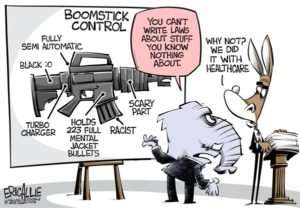Federal Judges Rewrite the 2nd Amendment
The most confusing dependent clause in the history of the nation, at least as far as personal liberty goes, is the one that begins the 2nd Amendment to the Bill of Rights. The full text of the amendment reads:
A well regulated Militia, being necessary to the security of a free State, the right of the people to keep and bear Arms, shall not be infringed.
 To understand what the Founders meant it helps to understand how much the former colonists disliked a standing army. As far as the Continental Congress was concerned the Revolution could be fought and won using an army composed entirely of citizen volunteers organized into local militia companies.
To understand what the Founders meant it helps to understand how much the former colonists disliked a standing army. As far as the Continental Congress was concerned the Revolution could be fought and won using an army composed entirely of citizen volunteers organized into local militia companies.
George Washington, the man actually in charge of the fighting, thought this was madness. He and the Congress had a running battle throughout the war over recruiting, equipping and paying a regular army. Washington believed only a professional, disciplined body of troops armed with military weapons could defeat the British.
Militia units simply wouldn’t stand up to line infantry. Civilians in the colonies usually owned rifles, not muskets. This meant a civilian could fire accurately at longer distances than a smooth–bore musket, but his rate of fire was not as rapid as the easier–loading musket.
Rate of fire, however, was secondary to the main problem with civilian arms: The inability to attach a bayonet to the rifle. Regular infantry charged with fixed bayonets and the men with spears always overwhelmed the men with clubs.
Militia members weren’t forbidden to buy muskets with bayonet lugs on the barrel. It was simply a matter of choice. Civilians would rather shoot a deer at 100 yds. and walk up to claim dinner, as opposed to chasing Bambi down and stabbing him with a bayonet.
As the war progressed militia units were used as skirmishers to pepper British troops with long range fire and then retire behind the regulars as the lines closed. So in the end both Washington and Congress were partially correct.
Once the war concluded under the Articles of Confederation the regular army languished, except for a remnant that manned frontier forts. State militias, again composed of volunteers bringing privately own weapons, provided defense against Indian raids and other disorder.
Before the outbreak of the Civil War there was private militia cavalry and even artillery companies operating without government control.
The role of civilian militia volunteers was codified in the Bill of Rights by the 2nd Amendment and the lasting rancor against a large regular army was found in the 3rd Amendment, which prohibited quartering troops in private homes.
The word “militia” in the 2nd Amendment means the “arms” citizens have a “right” to bear are by definition weapons of war. The Constitution doesn’t give us the right to own a BB gun or participate in paintball conflicts.
The Constitution gives us the right to own and bear light infantry weapons.
That fact escapes all leftist judges. They think government grants the right, when the Constitution obviously holds the right exists independently of government, which shall not infringe upon it.
The case that cannot be made by anyone reading the plain language of the amendment and knowing anything of history is that the 2nd Amendment does not cover weapons that are either military in nature or resemble military weapons.
Yet that is exactly what the U.S. 4th Circuit Court of Appeals did when it voted 10–to–4 to uphold an unconstitutional Maryland law that bans ownership of “assault weapons and large–capacity magazines.”
Ignoring “militia,” “arms” and “shall not infringe” the court sounded more like Chief Justice Oprah Winfrey when it concluded, “Put simply, we have no power to extend Second Amendment protection to the weapons of war.”
Only the justices don’t have to extend anything, the 2nd Amendment already protects “weapons of war.” Their job was to stop an obvious infringement upon that right.
Evidently the justices equate a militia to a sort of colonial bowling league. Just as you wouldn’t want bowlers rolling a cannonball down the lane, you wouldn’t want civilians owning a “military style” rifle. The problem with that reasoning is the militia was designed and expected to function in place of a regular military and to fulfill that role civilians must, by necessity, have weapons of a “military nature.”
Enlightened judges may not like the language of the Constitution. They may think the language is outmoded and superseded by modern life. But it is a violation of their oath of office to re–write the document to their liking or ignore provisions with which they disagree.
The Founders wisely provided a mechanism to amend the Constitution. It involves Congress, the states and voting. It does not include 10 politicians in black robes.




